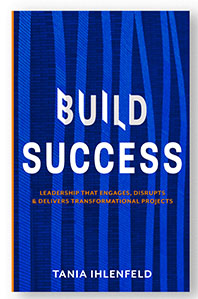
Help decision-makers to avoid overwhelm
As we head into the pointy end of the year, I’m hearing a lot of talk about overwhelm, exhaustion leading to poor decision-making, and teams that are overworked and stretched in the run-up to December deadlines . . . this happens, year after year.
You can’t blame teams who are responding to client demands and you can’t blame clients for wanting great information to base their decisions upon and achieve agreed project deadlines.
So who is to blame?
It just pains me that we know the pressure is coming and yet we feel unable to reign in it.
Under normal circumstances, I would recommend that if decision-making is stalling and teams are producing work that isn’t focused and on point to help this process, you need to revisit the project vision and the principles that underpin it. Unquestionably, the single most powerful mechanism to align teams, stakeholders and decision-makers at every stage of the project.
However, at crunch times, like the run-up to the end-of-year deadlines, I understand that most people revert to survival mode. Seeking to produce copious amounts of material in a vain attempt to help decision-makers make crucial decisions that will propel the project forward.
This is where I believe we don’t help decision-makers at all.
We’ve all heard the term less is more, and it's true BUT only if the ‘less’ is properly considered and negotiated beforehand.
My plea to design teams at this time of year is to negotiate what information is absolutely essential for key decisions to be made. Then be disciplined in delivering this in the most effective way possible. AND for decision-makers to be honest and open about what they need from design teams. For example, where they are struggling to pin down concepts, budgets, stakeholder agreements, and anything else that is preventing great decisions.
I don’t want to paint a picture that this is easy. It’s not.
In my experience, it is a great advantage to have a dedicated governance group to spearhead decision-making and approvals throughout a project’s journey. Their primary role is to be an internal advisory board that reviews and approves information that is required to make decisions, whilst also shaping content to be shared with stakeholders, and arguably with the wider team. This will not only improve the efficiency with which you make decisions but also gain support from key stakeholders. The fact that decision-makers can declare what they need helps them to verify and trust the outcomes.
If information sharing is not managed effectively between decision-makers and wider project teams it can lead to mistrust, the development of unresolved challenges as well as delays and abortive work.
The right information at the right time.
Avoid the temptation to produce more information for decision-makers.
Whilst I appreciate that the intent is good - ie. help the decision-makers by arming them with everything they could possibly need to know to make an informed decision. What do think is the actual reality of producing copious amounts of material for people to chew on?
Yes, absolutely right, it confuses them.
It lulls them into a false sense of security that everything is here. Then when they start to wade through it they realise it doesn’t satisfy their needs or they simply can’t find what they need because the powerful information is too diluted or lost. Which can result in poor decision-making or worse still, no decision at all.
Aim to produce less, and have this material fully vetted and scrutinised. It’s better to know sooner rather than later what is the essential information to inform the key decisions.
Be prepared to test what this looks like with your audience of decision-makers in advance or as you go. Because even some of the smartest most inspiring people make their best decisions when the information is right in front of them - and not before.
This process can be smarter.
It starts with leaders asking for the right information at the right time. It also helps to encourage teams to pursue the vision, manage expectations for decision-makers, be resourceful and to feel confident to escalate issues – design or otherwise – when required.
Empower and reward your teams to put the right information forward.
We need greater transparency for decision-making and to support our leaders in being bold enough to declare what they need or to ask for help in defining it.
If you would like help streamlining decision-making on your project or within your teams book a call with me to see how I can make your leadership role more effortless and enjoyable.
I have written a book - BUILD SUCCESS - that is intended as a pragmatic blueprint to support courageous leaders in pursuit of high-quality project outcomes. Our industry has some amazing opportunities and challenges ahead, that can use our collective wisdom. You can book a call or check out my new book, plus learn more about our resources and services available for every budget with the tabs above and below.
Enabling your success!



